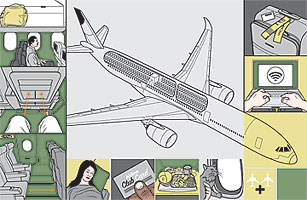
The slopes of the Rockies beckoned for spring skiing. The airfare seemed reasonable enough on short notice: New York City to Denver for $386 round-trip. But United wasn’t finished trying to pry money out of me. At the self-service check-in kiosk, I was offered a chance to upgrade to Economy Plus for $40. Did I have bags to check? The first was $25, the second $45. Did I want to shortcut the security line and board early with the swells, or hope there’d be room in the overhead bins when I got to them? Call it a dehassling fee: $29. The extras, all told, could have added as much as 50% to the ticket price.
Welcome to the unbundled skies. Unbundling is the practice of separating as many cost components as possible — in the case of air travel, baggage, boarding, meals, miles, wi-fi — and selling them apart from the basic fare. Airlines are reeling from high fuel costs, so they are taking unbundling to new altitudes. Travel consultant Jay Sorensen, president of IdeaWorks, has identified 35 add-ons, from standard charges such as baggage and food fees to more exotic options like flight-delay insurance — or how about a fee to keep the middle seat next to you empty? A la carte pricing gives the airlines shelter from fierce fare wars. Thanks to Expedia, Kayak and other websites, you can discover the cost of flying from Dallas to Boston on most airlines. So nonrefundable coach fares have been driven down to the point that the airlines figure out what they have to charge to get a plane 75% filled — past the break-even point. That allows the airlines to shift capacity risk to you — meaning that if you don’t show, it’s your loss, not theirs, says consultant Olivier Fainsilber of Oliver Wyman. There’s not much profit in it, though. The airlines do earn money selling “optionality,” mostly to business travelers who pay a premium for refundable fares or the option of changing or canceling flights.
Unbundled services, on the other hand, can be far more profitable than selling seats: the prices aren’t posted on websites, for one thing. The profit margins on ancillary revenues are as high as 80%. That’s why the carriers are going to take unbundling as far as they can. The industry’s revenue from add-ons grew to $21.46 billion last year, up 96% in two years. United’s ancillary revenues are up 150% since 2007. American’s were nearly $2.2 billion in 2009, says Sorensen, about 9% of total revenue. The majors see plenty of room for growth given what some of the minors are doing: Allegiant Air grabs 29% of its revenue from extras. Airlines once flew two- or three-cabin aircraft that had clear distinctions in price and service. Now there’s business class and what has essentially become a variable class of service for every seat in coach. Many travelers appreciate options like more legroom. But the lack of consistency among airlines as to what they will charge extra for will be a source of frustration as unbundling plays out.